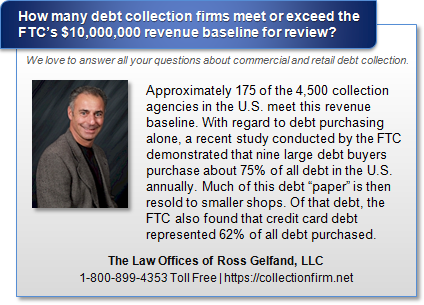 |
| Image courtesy of ponsulak / freedigitalphotos.net |
For an
industry that relies so heavily on communication devices to reach their
targets, debt collectors have been carefully watching how the Federal Trade
Commission interprets and enforces laws relating to their business for decades. Collection agencies and collection attorneys
have been paying particular attention to the Federal Debt Collections Practices
Act (FDCPA) and the Telephone Consumer Protection Act (TCPA) because the
language of both acts – the first written in 1977 and the latter amendment
created in 1991 – predate many modern technologies, especially text messaging
and ringless voicemail.
The FTC has no rulemaking authority, but frequently
uses its enforcement authority to telegraph how it plans to interpret rules and
regulations going forward. Recently, the
FTC brought the first case against a collection firm based in Glendale,
California that involved the sending of text messages and found that the firm
had violated the clear disclosure rule of the FDCPA when it used text messages
that made no reference to debt and did not obtain prior permission from the
consumer. The company in question agreed
to a $1 million settlement and to accept guidelines for future collection
attempts.
The ruling was enlightening because the FTC chose its
words very carefully to state that it does not matter where the transmission
was targeted (i.e., a land-line phone or device). In fact, the FTC underlined the issue in a
post to its web site, writing ‘Regardless of the means you choose — mail, phone,
text, or something else — the law applies across the board.’
Thus, the
FTC’s policy going forward is relatively clear: There will be no tolerance for “loopholes”
regarding text messages or so-called “ringless voicemail” messages that bypass
a mobile phone’s ringer and allow direct recording to voicemail. The FTC clearly intends to regard any
communication without clear and prominent disclosure as a violation of the
FDCPA and/or the TCPA.





